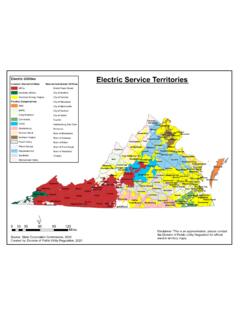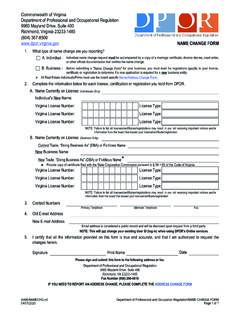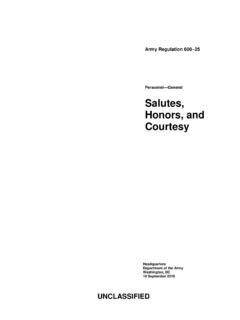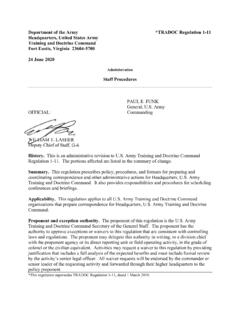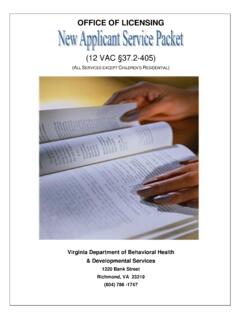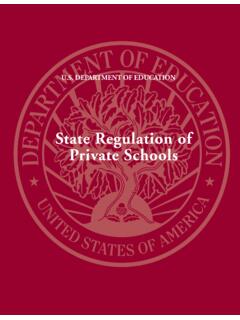Transcription of Frequently Asked Questions (“FAQs”) Regarding “Split ...
1 Frequently Asked Questions ( FAQs ) Regarding Split Settlements . [These FAQs may be updated as needed to provide more current information.]. On February 4, 2022, the Bureau of Insurance ( Bureau ) issued Administrative Letter 2022-01 ( Letter ) addressing the practice of split settlements that is sometimes used when effectuating real estate settlements in virginia . Subsequently, the Bureau received several inquiries about the Letter, seeking further clarification of certain issues. As such, the Bureau is providing the below responses to Frequently Asked Questions ( FAQs ) Regarding the Letter. The Bureau notes that these responses pertain to its regulation of Title Settlement Agents ( TSAs ) pursuant to the Real Estate Settlements Act, et seq. of the Code of virginia ("Code") ("RES") and Real Estate Settlement Agents Act ("RESA"), et seq. of the Code. The Bureau further notes that the Letter is intended to interpret existing virginia law, and not to create new law or policy.
2 The Bureau further recommends that non-TSAs ( attorneys, real estate brokers, financial institutions or authorized affiliates as identified in (1)(4)(5)(6) of the Code) address Questions specific to their regulatory requirements to their respective regulatory or licensing authority. 1. Does the Bureau intend to pursue immediate enforcement of TSAs participating in split settlements ? The purpose of the Bureau's administrative letters, including this specific Letter, is to educate licensees prospectively about the Bureau's interpretation of relevant laws and regulations . As such, it is not the Bureau's intent to disrupt any pending closings or settlements. However, TSAs should review their policies Regarding split settlements to ensure compliance with applicable laws and regulations as soon as possible. 2. What activities are covered by the term administrative and clerical services.
3 As used in the Letter, and who is responsible for performing these administrative and clerical services? Section of the Code provides that [e]scrow, closing or settlement services means the administrative and clerical services required to carry out the terms of contracts affecting real estate. Administrative and clerical services, as contemplated by this statutory provision, include placing orders for title insurance, receiving and issuing receipts for money received from the parties, ordering loan checks and payoffs, ordering surveys and inspections, preparing settlement statements or closing disclosures, determining that all closing documents conform to the parties' contract requirements, setting the closing appointment, following up with the parties to ensure that the transaction progresses to closing, ascertaining Posted and Updated as of February 16, 2022. that the lenders' instructions have been satisfied, conducting a closing conference at which the documents are executed, receiving and disbursing funds, completing form documents and instruments selected by and in accordance with instructions of the parties to the transaction, handling or arranging for the recording of documents, sending recorded documents to the lender, sending the recorded deed and the title policy to the buyer, and reporting federal income tax information for the real estate sale to the Internal Revenue Service.
4 A designated TSA is permitted to oversee and engage one or more third parties performing administrative and clerical services on its behalf. However, to the extent the designated TSA decides to engage or rely upon a third party to perform any escrow, closing or settlement service necessary to effectuate settlement, it is the designated TSA's ultimate responsibility to ensure that these services, along with the TSA's other fiduciary responsibilities, are properly performed. 3. Does the Bureau's Letter or position mean that a seller 1 cannot retain representation or legal counsel for a real estate transaction? The Bureau's Letter does not prohibit a seller from retaining representation or legal counsel to assist during the settlement process. However, retention of such a separate individual is the seller's decision and does not in and of itself make such person the designated settlement agent.
5 Additionally, the Bureau's Letter does not prohibit the settlement agent from communicating with a seller's lawyer or representative. TSAs and non-attorneys should also ensure that they refrain from engaging in any activities that would constitute the Unauthorized Practice of Law ( UPL ) in violation of the provisions of Title 54, Chapter 39 of the Code. Questions concerning UPL should be addressed to the virginia State Bar through its hotline ( ). 4. Does the Bureau's Letter or position prohibit a TSA from allowing an attorney hired by the seller to perform legal services falling outside those identified as [e]scrow, closing or settlement services ( , preparation of a deed)? The Bureau's Letter does not prohibit a seller from retaining representation or legal counsel to assist during a real estate transaction. Additionally, because certain tasks necessary to consummate a proper settlement ( , preparation of a deed).
6 Must be performed by a virginia licensed attorney, the designated settlement agent may opt to rely upon information and documents provided by the seller's attorney to effectuate this part of the settlement. However, the designated settlement agent remains responsible for overseeing the settlement and obtaining 1 Though Questions received by the Bureau have focused on the seller's ability to retain separate counsel, nothing in the Bureau's Letter is intended to prevent any party to a real estate transaction from engaging separate representation or legal counsel. Posted and Updated as of February 16, 2022. appropriate records and information necessary to conduct and complete the settlement. 5. Does the Bureau's Letter intend to address only those split settlements . that are conducted between two lay ( non-attorney) settlement agents? The Bureau only regulates TSAs pursuant to and et seq.
7 Of the Code. These TSAs are expected to come into compliance with applicable laws and regulations that provide for one settlement agent who has a fiduciary duty to provide escrow, closing and settlement services. As stated in the Letter, the Bureau notes that of the Code provides that the settlement agent is identified by the buyer and is the designated settlement agent on the settlement statement. Accordingly, the role and responsibility of a TSA designated by the buyer pursuant to of the Code is not altered by a party's decision to retain separate representation or legal counsel. 6. Does a TSA designated by the buyer as the settlement agent pursuant to of the Code only represent the buyer's interests during a real estate transaction? When conducting escrow, closing and settlement services to effectuate a settlement, a TSA designated as the settlement agent does not (and in fact, as a non-attorney, cannot) represent either party in the transaction.
8 Instead, a TSA. designated as a settlement agent is responsible for (among other duties and obligations outlined by RES and RESA) exercising reasonable care when overseeing the settlement transaction, 2 and as part of this process, handling funds received and disbursed in a fiduciary capacity. As referenced in FAQ No. 3 above, TSAs must also refrain from engaging in UPL when providing escrow, closing and settlement services. The Bureau also recommends that non-TSA settlement agents ( attorneys, real estate brokers or others identified pursuant to of the Code) review and consult the laws, regulations , rules, and guidance issued by their respective regulators to ensure appropriate compliance with RES, RESA or other applicable laws and requirements. 2 Additionally, as with any settlement transaction, fees charged by a TSA should be related to the specific escrow, closing or settlement services provided, and should not be padded or duplicative.
9 See 14 VAC 5-395-75. Posted and Updated as of February 16, 2022.






